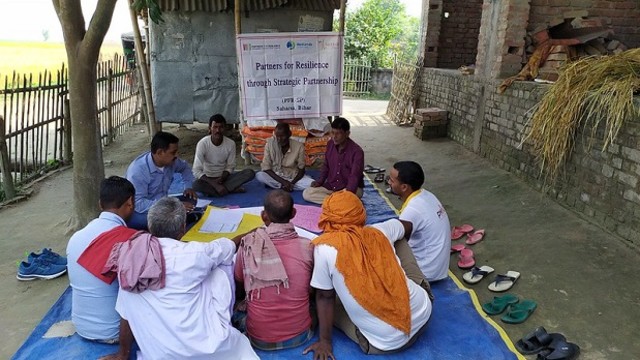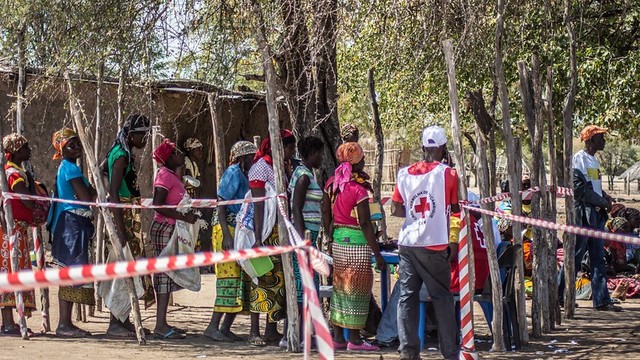Introduction to our work on climate-resilient development
IIED is helping government and non-government policymakers and planners design, implement and evaluate public policy responses to climate change.

Farmers irrigate onions in Ethiopia. Three failed rainy seasons resulted in the country's worst drought in 50 years in 2016 (Photo: EU Civil Protection and Humanitarian Aid Operations/Anouk Delafortrie, via Flickr, CC BY-NC 2.0)
From heatwaves and wildfires to tropical storms , flash floods and catastrophic droughts, communities and ecosystems around the world are suffering extreme weather events more frequent and intense than anything they have in the past.
Driven by climate change, these shocks will only worsen with every increment of global heating, potentially exposing billions of people to catastrophic loss and damage by 2050.
Climate shocks result in loss of life, land and homes, income and opportunity, social cohesion and cultural identity for affected people, and also damage infrastructure and ecosystems, productive sectors and public services. These impacts undermine the ability of households, communities, regions, cities and nations to adapt to climate change and to achieve their sustainable development goals.
Furthermore, the slow onset impacts of climate change from sea-level rise, glacier melt, soil salination, ocean acidification, biodiversity loss and desertification, threaten to render livelihoods unviable and regions uninhabitable, unless urgent action is taken to ensure communities and countries can adapt and build the resilience they need to cope with climate risks.
Low-income communities are most at risk from climate impacts, especially in the Least Developed Countries (LDCs) and Small Island Developing States (SIDS). They stand to suffer the most from the global climate emergency, despite having done the least to cause it. Not only are they more exposed to climate impacts, they are also least able to adapt.
But by developing and implementing policies, plans and budgets to foster climate-resilient development that are risk-informed, flexible, holistic, inclusive and locally-led, vulnerable countries and communities can establish the capabilities, systems and institutions they need to manage climate risks, minimise climate impacts and thrive in spite of the climate challenges they face.
Responses to climate change are shaped by the political economy in which they are embedded, and public policy choices can either enable or obstruct equitable and effective climate action, so our work focuses on how vulnerable low-income countries and communities can:
- Achieve climate-resilient development that benefits the most vulnerable people, by integrating robust climate risk analysis and locally appropriate resilience building and adaptation measures into national and local development policies, plans and strategies, and by developing the capabilities, technical systems and governance institutions to deliver them effectively and equitably, and
- Minimise the impacts of climate change for the most vulnerable people, by understanding the risks they face, and by designing and delivering effective approaches to address loss and damage through interventions to prepare for, respond to, recover from or avoid climate shocks over the short, medium and long-term.
What is IIED doing?
We work with actors across the whole of society to design, test and evaluate innovative solutions that can deliver climate-resilient development outcomes for the poorest and most vulnerable segments of society. This work includes:
- Generating knowledge on the risks vulnerable countries and communities face from climate change, and the most appropriate strategies and approaches they can use to manage risk, build resilience and adapt to climate change
- Advising governments, communities and other actors how to design and implement policies, plans, strategies and technical approaches that can deliver equitable climate-resilient development outcomes for the most vulnerable people
- Supporting communities, local and national governments, and other actors to make better-informed decisions on how they manage climate risks and adapt to climate change, by integrating climate risk analysis into planning, budgeting and policymaking
- Helping local and national governments, vulnerable communities and other actors to design and establish flexible, inclusive, integrated institutional arrangements to manage climate risks, deliver locally-led adaptation, and address climate-related loss and damage, and
- Assessing and understanding the effectiveness of different approaches to delivering climate-resilient development outcomes for vulnerable people.
Find out more
- Briefings on national climate finance from government experts in developing countries:
- Zanzibar planning and financing systems for climate change initiatives, Sihaba Haji Vuai (2014), IIED Briefing Paper
- Climate change financing in Nepal, Hari Prasad Sharma (2014), IIED Briefing Paper
- Climate finance governance in Bangladesh: synergies in the financial landscape, Mousumi Pervin and Sheikh Moinul Islam Moin (2014), IIED Briefing Paper
- Climate change financing in Kenya, Vincent Mutie Nzau (2014), IIED Briefing Paper
- Climate change financing in the Gambia, Isatou F Camara (2014), IIED Briefing Paper
- Financing a transition to climate-resilient green economies, Nanki Kaur, John Rwirahira, Daniel Fikreyesus, Neha Rai and Susannah Fisher (2014), IIED Briefing Paper
- Climate resilience: from mainstreaming to ‘main-streamlining, Nanki Kaur and Mousumi Pervin (2013) IIED Reflect and Act
- Participatory Monitoring, Evaluation, Reflection & Learning (PMERL) for Community-based Adaptation: a manual for local practitioners – a toolkit produced by CARE International, with technical input by IIED
- Contributory outputs to the Nepal Climate Change Support Programme, Ministry of Science, Technology and Environment, Government of Nepal:
- Assessing the CBA community of practice, Sabine Gundel, Simon Anderson, Nanki Kaur and Corinne Schoch (2013) IIED Briefing Paper. Learning from IIED's conference series on community-based adaptation, this briefing looks at the 'what, who and how' of forming communities of practice, then looks ahead to an evaluation of whether, and how, why and when, such a community achieves better policies and practice to support local climate adaptation.
Contact
Simon Addison (simon.addison@iied.org), principal researcher (climate governance and finance), IIED’s Climate Change research group



